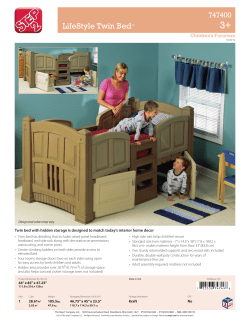
Starting School: School Admissions hurdles and how to negotiate... early years obstacle course! Beginnings
Starting School: School Admissions hurdles and how to negotiate the early years obstacle course! Beginnings It only seems a few moments since your bundles of joy were first put into your arms… and now you are considering the big step of their starting school. You have probably encountered the ‘social novelty’ that twins present to society in general, but you will also have realised just how complex their interrelationships are and you will want to take these into account at this important point in their lives. As your children have grown and developed you will have been in a unique position to gain insight into their psychology and identity. By observation and experience you will have come to know your children the best – better than anyone else. Do not jettison this expertise just because your children are starting school. In all that happens thereafter, whilst recognising and respecting the expertise of well-trained and experienced professionals, never forget that you are your children’s first, closest and best trained advocates. Looking for the right school Many of you will have gone through a process of selecting pre-school provision but choosing a school and preparing your children to start their formal education can feel a bit daunting. For one thing, this is your first really long-term commitment. No-one chooses to drag their children from one school to another unless life circumstances dictate this. We all hope to settle our children into a school in which they will spend a significant part of their next few years. The Process Each local authority has slightly different arrangements, so check carefully with the website for dates and deadlines. You will probably look at league tables, listen to friends’ advice and assume that your nearest school is the one at which you will naturally be offered places. We are encouraged to believe that parental choice is a strong feature of modern educational arrangements – but it isn’t as simple as that. You will need to check on catchment areas – they sometimes follow strange boundary lines. If the school you like is one for which you are out of catchment and is a popular, over-subscribed school, you are setting a high hurdle to cross. You may be lucky enough to gain a place in it – but perhaps only one. Some families are asked to choose which twin they wish to attend the school! You will then be in the unenviable position of navigating the appeals process. Appeals are heard over a long period of time – from the beginning of the year right up to July or even August. This can be very unsettling for your family and make preparing for school a difficult and stressful time. If you select three ‘out of catchment’ schools for your application you are unlikely to gain your first, second or even third choice. If you receive offers of places at a fourth school you are likely to perceive this as discrimination – ‘punishment’, almost, for having twins. To avoid such eventualities many local authorities have independent admissions advisors whose job it is to advise you of the practical and likely outcomes of any application, and to draw your attention to realistic choices. It would be a good idea to use this service wherever it is in place. Bearing all this in mind, what should be your criteria for choosing a school? 1. Twin-friendly - does the school recognise the particular needs of twins and does it treat them on an individual basis? 2. Together or apart? – is this an option? 3. Opportunities both in and out of school to develop their individual, unique potential In my own research into twins in school I observed some fascinating behaviours and gathered evidence from twins of all ages, gaining their perspective on life in school. (We, as adults, understand childhood through a mixture of memory and imagination – it takes time and effort to put ourselves into our children’s place in an attempt to see things through their eyes – and we may get it wrong.) Twins need each other and see the world through a twin construct – whether we (or they) like it or not. In our dealings with our multiple birth children we have to think outside the box. There will be, again and again, events which test us in our understanding of their world. Psychological needs Twins need each other in the early years – so try hard to get them into the same school (unless there are very good reasons for doing otherwise: e.g. profound special needs) and if you are offered places in 2 different schools contact Tamba and ask to be referred to me. I will help all I can. (I can offer further help and advice on the appeals process if you contact me via the Tamba office.) Same class / separate class? In my observations of so-called ‘independent’ twins I recorded endless cross-classroom interactions. Children whom staff and parents believed to be happily independent and not needing each other in school, were actually gaining constant security from visual, spoken and tactile contacts throughout the school day. Most of these were passing unnoticed and did not affect the work of the teacher or the other children. Many twins are less troubled about leaving Mum than parting from each other. (Think about it – how many examples are there, in your family experience, where twin approval counted far more than parental approval?) Some twins really do need to get away from each other – you’ll know if yours fall into this category if physical violence has become a huge issue and you are wearily embarrassed by the scratch marks on your children’s faces. Where one twin does all the talking and chores for the other, there could also be good reason for separation. Each situation needs to be looked at very carefully and other agencies involved where there are profound difficulties. (Audrey Sandbank – Family Therapist – acts as Honorary Consultant in this area.) There will come a time when separation is a natural step for your children – but start of school may well be a bit too soon. Be sure, when you are deciding this, that your thinking is as twin-centred as you can make it and not your own desire to do things neatly and conveniently. You will also need to plan for the separation over a period of time – getting there in small steps. If you have older or younger children you will already know that the arrival of another baby can set the earlier one(s) back a bit (often back into nappies and ‘baby’ behaviour). Any big transition tends to have this (temporary) effect, so expect your children to regress for a bit when they start school. This should all sort itself out in time. Looking different Having struggled for several years to emphasise your children’s unique qualities, often allowing them to develop individual dress sense, school uniform can pose a bit of a problem. Boy/girl twins – clearly no problem. Girl/girl twins – you can vary hairstyles, ribbons, choose different socks Boy/boy twins – not so easy – but sometimes there is a choice of trouser / sweater colour – so make the most of any such options. Remember that all twins should have the right to pretend to be each other – at least once! Try to make the differences clear – sometimes the teachers have only a split second to judge before wading in! PE can be a very important time for this. It ranks alongside playground play for potential disaster – so think about how you can make the differences clear – discuss PE kit with the teacher, and consider different coats in the playground. Note: If your twins are together teachers inevitably compare them. If apart – YOU compare the TEACHERS! Other areas of possible difficulty are set out in the Tamba literature – things like parents’ evenings, letters home, social interactions outside school etc. so I strongly recommend buying the booklets. The main things to bear in mind 1 twins remain twins and will go through education their own way. Your job is to try to keep the way as smooth as possible. 2 Recognise that they will compare themselves with each other – see their performance against that of the other twin. This can lead to complex outcomes which I wouldn’t want to scare you with now. Contact Tamba if you are worried. 3 In reference to the above – it is vital that you help your children to realise that a) life isn’t always fair – so they will need to get used to this b) everyone has bits that they are good/bad at (fast/slow too, come to that) c) everyone counts 4 5 d) whatever happens you’ll be there cheering them on Each twin’s school life is their story – so hear it from the one concerned In terms of academic ability – sometimes twins try to copy one another too closely, or, conversely, polarise their interests in order not to compete. Watch out for this over time, as it may affect choices and performance, as well as self-esteem. Other thoughts Once your twins separate (and they will eventually) they’ll have lots to talk to each other about – there’ll be ‘news’ over tea. Don’t allow any unhappy situations to fester – go to the school and talk it through with the teacher. Have your own ‘bottom line’ in terms of distress. Mine was bed-wetting (never happened) In other words, make sure it is a significant issue and not just a passing cloud. Daily tummy ache can be a reliable indicator that all is not well. When you prepare your children for school make sure that they can both/all do the routines and that one hasn’t been molly-coddling the other(s). Remember that no matter how ill-prepared your children are right now, they’ll mature amazingly through the summer. Start ‘grooming’ the other mums to set up the social interactions you want – many parents have to give permission for others to invite just one twin over after school. (Think of the fun you can have with the one left behind… or phone a friend!) Read the Tamba literature on starting school – it’s full of practical help. Keep smiling! Anne Thomas October 18th 2008
© Copyright 2025





















